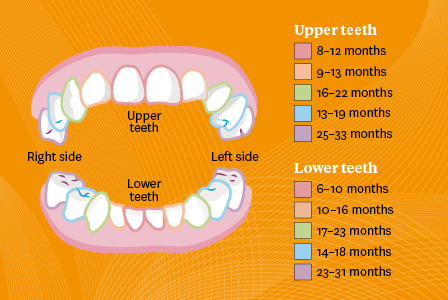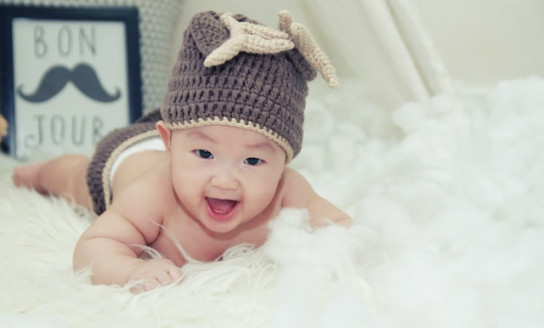Baby teeth order
Baby teeth can come through in any order, but most often the central bottom teeth are first to break through.
Here’s the usual order teeth come through the gum. Don’t worry if your baby’s teeth follow a different pattern – they’ll all break through the gums at some point.

Ministry of Health
Teething
Every baby reacts differently to teething. Some babies’ teeth pop through the gums without any problems, but for others teething can be painful and upsetting.
Your teething baby may:
- drool more
- develop a dribble rash on their cheeks or chin
- cry or seem grumpy
- have a slight fever
- have red cheeks
- not eat or sleep well
- want to suck on or bite things
- pull the ear on the same side the tooth’s coming through
- seem to be filling their nappy more than usual, or have different poo (which may cause nappy rash).
Teething doesn’t make babies sick. If your baby isn’t well, it’s always best to take them to the doctor, especially if they have a fever or diarrhea, or you’re worried about any other symptoms.
How to help your teething baby
It can be really upsetting to see your baby in distress. Here are some things you can do to help:
- use a clean finger or the back of a cold spoon to gently rub their gums
- wrap ice cubes in a clean face cloth and place it on your baby's cheek
- give your baby something to chew on, like
- a clean teething ring (especially one you can cool in the fridge)
- other cold things that they can suck on, like chilled fruit wrapped in a muslin cloth so they can’t chew bits off and choke on them
- try a teething gel from the chemist (carefully follow the instructions on how to use it).
If your baby still seems unhappy or uncomfortable, it’s time to see your GP or child and family health nurse. Teething might not be the problem.
Teething and breastfeeding
New teeth are super sharp, and it can really hurt if baby bites you while you’re breastfeeding. Pulling them off the breast while they’re biting can be even more painful.
If your baby’s a biter, try taking them gently off the breast when they bite (by inserting your finger in the corner of their mouth to break the suction), have a short break, and then try again. Doing this every time they bite will teach them that breastfeeding stops when they do it.
Your baby’s first teeth are important to help them eat and speak properly, and they guide the development of the second set of teeth. That’s why you need to look after them.
You can start caring for and cleaning your baby’s gums well before the first tooth appears. Just wrap a clean, damp facecloth or gauze around your finger, and gently wipe their gums a couple of times a day. This is a good idea because it gets them used to letting you touch their teeth and gums.
As soon as teeth pop through, you can clean them twice a day (in the morning and before bed). You can use a small soft toothbrush with a thin smear of regular-strength fluoride toothpaste to gently brush your child’s teeth. Fluoride makes teeth stronger and reduces tooth decay (holes).
How to brush your baby’s teeth
Babies can be super wriggly, and getting them to sit still to have their teeth cleaned can be challenging - but it’s worth the effort. Here’s how to do it:
- place your baby in a position where you can see their mouth, and where they feel secure
- cup your baby’s chin in your hands, with their head resting against your body
- clean their teeth using gentle circular motions
- lift their lips to brush the front and back of the teeth and at the gum line
- when you’ve finished, rinse the toothbrush with tap water, and store it upright in an open container so it can air-dry. Make sure it doesn’t rest against other family members’ toothbrushes, so decay-causing germs won’t travel between brushes and into your baby’s mouth.
You should replace toothbrushes every three to four months, or when the bristles get worn or frayed.
Choosing healthy drinks and food
At around six months old your baby might be ready to start eating solid food, and to start drinking from a sipper cup.
To protect your baby’s teeth, choose healthy foods and drinks. Milk or boiled water can be given in a bottle or sippy cup. Sweet drinks, foods and juices can cause tooth decay and cause your baby to develop a taste for sugary foods. Children don’t need sweet drinks – milk and water are all they need.
It’s not a good idea to put your baby to bed with a bottle, because going to sleep with a bottle of milk, a warm chocolate drink or juice will start to cause tooth decay. If they want to suck on something to settle themselves, you could use a pacifier/dummy with no sweetener.
Read more about teeth and teething
